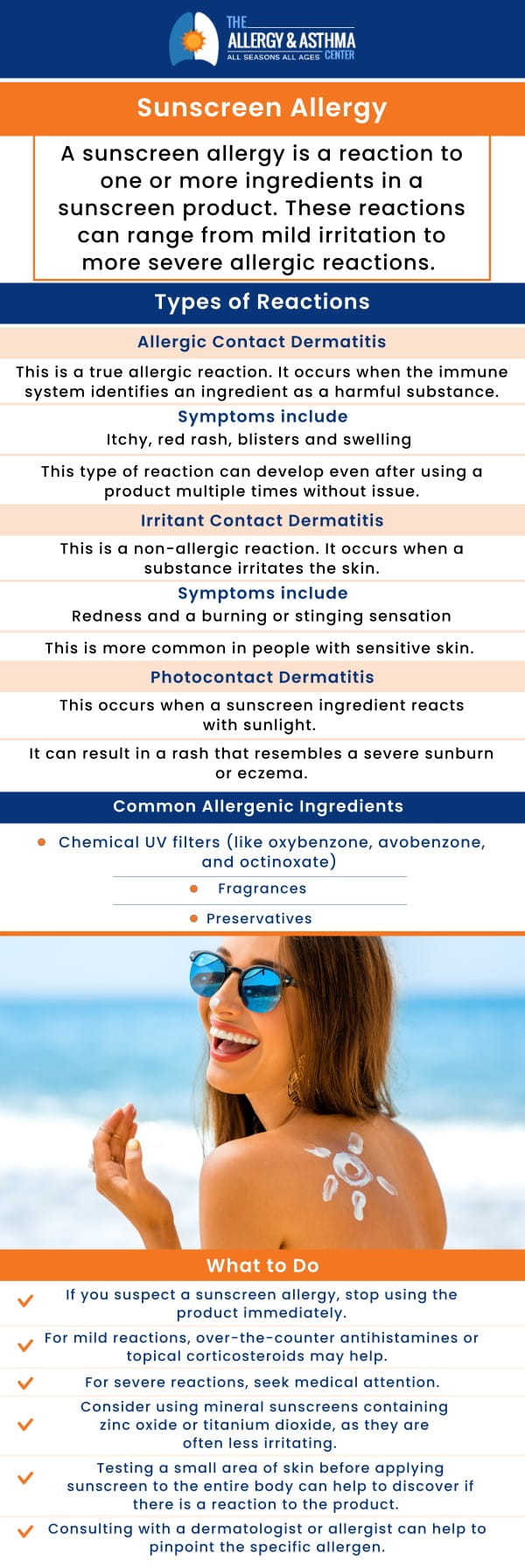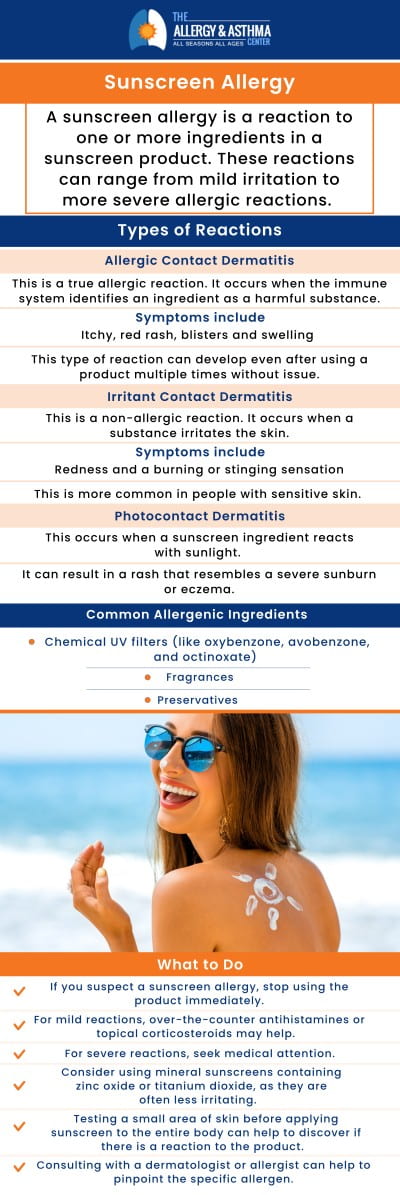Sensitive Skin? Discover the Benefits of Hypoallergenic Sunscreen
Dr. Jon E. Stahlman, MD, and our team of skincare professionals at Allergy & Asthma Center recommend hypoallergenic sunscreen for individuals with sensitive skin. Designed to minimize irritation, these sunscreens provide effective UV protection without harsh chemicals. Our experts can guide you in choosing the best options for your skin type. Contact us today or book an appointment online. We have 3 convenient locations to serve you in Lawrenceville, GA, Atlanta, GA, and Conyers, GA.


Table of Contents:
What is hypoallergenic sunscreen, and how does it differ from regular sunscreen?
Why is hypoallergenic sunscreen recommended for sensitive skin?
What ingredients are commonly found in hypoallergenic sunscreens?
Can hypoallergenic sunscreen provide the same level of UV protection as regular sunscreen?
Hypoallergenic sunscreen is specifically formulated to minimize the risk of skin irritation and allergic reactions, making it a suitable option for individuals with sensitive or allergy-prone skin. Unlike regular sunscreens, which may contain fragrances, dyes, or chemical UV filters that can irritate sensitive skin, hypoallergenic sunscreens focus on gentle, skin-friendly ingredients that provide effective sun protection without causing discomfort.
Reasons to Choose Hypoallergenic Sunscreen:
● Minimized Irritants: Hypoallergenic sunscreens are free from common triggers such as fragrances, dyes, and harsh chemicals, reducing the risk of skin irritation or allergic reactions.
● Gentle UV Protection: These sunscreens often use mineral-based UV filters like zinc oxide or titanium dioxide, which sit on the skin’s surface and block harmful rays without penetrating the skin, making them ideal for sensitive skin.
Key Benefits of Hypoallergenic Sunscreen:
● Skin-Friendly Formula: Designed for sensitive skin, these sunscreens prioritize comfort and reduce the likelihood of redness, itching, or flare-ups.
● Broad-Spectrum Protection: Despite their gentle formulation, hypoallergenic sunscreens provide comprehensive protection against UVA and UVB rays, safeguarding skin health.
● Safer for Allergy-Prone Individuals: For those with conditions like eczema, rosacea, or other skin sensitivities, hypoallergenic sunscreen offers a reliable and soothing alternative to conventional products.
Choosing hypoallergenic sunscreen ensures effective sun protection while catering to the needs of sensitive skin, making it an excellent choice for individuals seeking gentle and allergen-free skincare.
Sensitive skin, often prone to irritation and heightened reactions to environmental factors, requires extra care when choosing skincare products. Regular sunscreens can contain fragrances, dyes, or chemical UV filters that may exacerbate sensitivity, causing redness, itching, or discomfort. Hypoallergenic sunscreens are specifically formulated to address these concerns, making them a safer and more effective option for protecting sensitive skin.
Key Features of Hypoallergenic Sunscreens:
● Free from Irritants: Hypoallergenic sunscreens avoid common allergens such as parabens, fragrances, dyes, and oxybenzone, reducing the risk of adverse reactions.
● Gentle UV Protection: They typically use physical blockers like zinc oxide or titanium dioxide, which provide broad-spectrum sun protection without penetrating the skin, making them ideal for sensitive skin.
● Soothing Ingredients: Many formulations include calming agents like aloe vera or chamomile to soothe irritated skin and protect against environmental stressors.
Using hypoallergenic sunscreen ensures that individuals with sensitive skin can enjoy outdoor activities without worrying about triggering discomfort or worsening skin conditions. These sunscreens offer vital protection against harmful UV rays, reducing the risk of sunburn, premature aging, and long-term skin damage such as skin cancer. For those with pre-existing sensitivities, hypoallergenic options provide an essential balance of protection and care, promoting healthier and more comfortable skin.
Hypoallergenic sunscreens are specially designed to protect sensitive skin from UV damage while minimizing the risk of irritation or allergic reactions. These sunscreens prioritize gentle, effective ingredients that suit individuals prone to allergies or with conditions like eczema or rosacea. Below is a breakdown of the key components commonly found in hypoallergenic sunscreens:
● Mineral Filters:
• Zinc Oxide: Provides broad-spectrum protection by physically blocking UVA and UVB rays without penetrating the skin, making it suitable for sensitive skin.
• Titanium Dioxide: Another gentle mineral blocker that protects against UV rays and is less likely to irritate chemical sunscreens.
● Soothing Agents:
• Aloe Vera: Helps to calm irritated skin and provides hydration, supporting the skin’s natural barrier.
• Glycerin: A hydrating ingredient that locks in moisture, keeping sensitive skin soft and comfortable.
• Chamomile Extract: Reduces inflammation and soothes redness, especially for reactive skin.
What Hypoallergenic Sunscreens Avoid:
● Fragrances and Dyes: Known irritants that can trigger allergic reactions or discomfort in sensitive skin.
● Parabens: Common preservatives that may disrupt sensitive skin’s balance.
● Oxybenzone and Other Chemical Filters: These can penetrate the skin and potentially cause irritation or allergies, making mineral filters a safer alternative.
● Artificial Preservatives: Hypoallergenic sunscreens avoid harsh preservatives to further minimize exposure to potential allergens.
By incorporating gentle, skin-friendly ingredients and avoiding irritants, hypoallergenic sunscreens ensure effective sun protection while promoting hydration and comfort. These formulations are ideal for individuals with sensitive skin or allergies, allowing them to maintain healthy skin without fear of adverse reactions.
Hypoallergenic sunscreens can provide the same level of UV protection as regular sunscreens when used correctly. The key determinant of sun protection is the Sun Protection Factor (SPF), which measures protection against UVB rays responsible for sunburn and contributing to skin cancer. Both hypoallergenic and regular sunscreens are available in a wide range of SPF levels, typically from SPF 15 to 50+, offering comparable protection when applied properly.
How Hypoallergenic Sunscreens Ensure Effective Protection:
● Broad-Spectrum Coverage: Like regular sunscreens, hypoallergenic formulations provide broad-spectrum protection, shielding against both UVA rays (which cause skin aging and deeper damage) and UVB rays.
● Physical UV Blockers: Hypoallergenic sunscreens often rely on physical blockers like zinc oxide and titanium dioxide. These ingredients sit on the skin’s surface, deflecting UV rays and offering effective protection while reducing the risk of irritation for sensitive skin.
● Avoidance of Irritants: Hypoallergenic options minimize exposure to potential allergens by excluding ingredients such as fragrances, dyes, and certain chemical UV filters, making them a safer choice for individuals with sensitive skin.
Tips for Optimal Sun Protection:
● Apply sunscreen liberally to all exposed skin at least 15–20 minutes before sun exposure.
● Reapply every two hours, or more frequently if swimming or sweating heavily.
● Choose an SPF of 30 or higher for general outdoor activities, ensuring adequate protection.
Hypoallergenic sunscreens provide effective and reliable UV protection, comparable to regular sunscreens while offering the added benefit of being gentle on sensitive skin. By following proper application practices, you can enjoy safe and effective sun protection without compromising comfort.
Our team is always here to help guide you in choosing the best sun protection options tailored to your unique needs. Contact us today or schedule your consultation online to learn more. We have 3 convenient locations to serve you in Lawrenceville, GA, Atlanta, GA, and Conyers, GA. We also serve patients from Scottsdale GA, Tucker GA, Rock Chapel Rd GA, Klondike Rd GA, Suwanee GA, Moon Place Rd GA and Dacula GA.

Additional Allergy & Asthma Services
▸ Allergy Shots
▸ Allergy Testing
▸ Asthma
▸ Bronchodilators
▸ Drug Allergy
▸ Food Allergy
▸ Insect Allergy
▸ Nasal/Sinus Allergies
▸ Pediatric Allergy
▸ Pediatric Asthma
▸ Skin Allergy
▸ Spring Allergies




